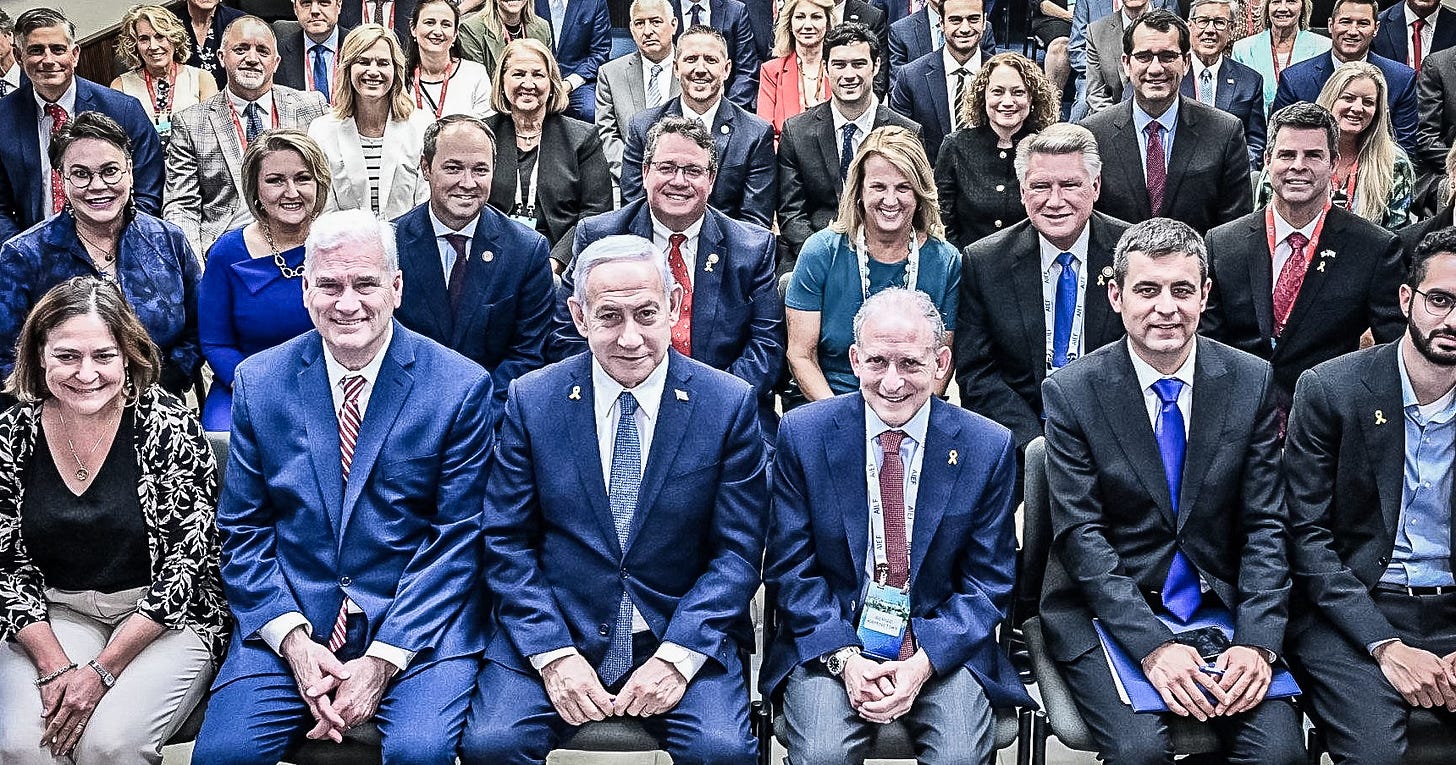Why Trump Supporters Are Turning Against Israel
Demands for censorship and accusations of antisemitism have backfired

Support for Israel is far higher among Republicans than Democrats. For example, a recent Gallup poll shows that 71% of Republicans approve of Israel’s military action in Gaza compared to just 8% of Democrats.
And yet the number of prominent right-wing voices criticizing Israel is increasing. Steve Bannon, Tucker Carlson, and Rep. Marjorie Taylor-Greene, who are all highly influential among President Donald Trump’s MAGA base, have called into question U.S. support for Israel. Even Michael Knowles of the Daily Wire, which is led by the strongly pro-Israel Ben Shapiro, said recently, “You’re losing me… A just war cannot just go on indefinitely.”
To be sure, the Trump administration remains steadfastly pro-Israel. Last week, the Department of Homeland Security (DHS) posted a grant notice stating that it would deny $1.9 billion in disaster relief funding to states and cities that boycott Israel. And the administration has punished anti-Israel sentiment and alleged antisemitism at universities by freezing federal funds and cancelling student visas.
But there is little doubt that Republicans’ view of Israel is becoming less favorable, and it’s the oldest Republican voters who appear to be most supportive of Israel, while younger voters are moving in the opposite direction. In 2022, 63% of Republicans under 50 viewed Israel positively, but in April 2025 50% of Republicans under 50 held a negative view of Israel. “That’s a shocking change,” noted UnHerd’s Washington correspondent Emily Jashinsky last week, “especially as younger generations begin to comprise more of the electorate.”
Consider the response from young conservatives online to DHS’ requirement that states not boycott Israeli companies. Many on social media asked how cutting funding for things like search-and-rescue equipment and backup power systems on behalf of a foreign nation was consistent with “America First.”
In response to the backlash, DHS partially backed off its threat. “There is no FEMA requirement tied to Israel in any current NOFO,” or Notice of Funding, a DHS spokesperson told Public. “No states have lost funding, and no new conditions have been imposed. FEMA [Federal Emergency Management Agency] grants remain governed by existing law and policy and not political litmus tests.”
Meanwhile, President Trump knows that his unconditional support for Israel is becoming increasingly unpopular. “My people are starting to hate Israel,” he reportedly told a major Jewish donor. “There are people in the White House who are watching this narrative develop in the right wing, in the MAGA world, that is very anti-Israel, very anti-Jewish,” explained a Mideast expert in the administration.
For decades, Israel held onto Americans’ support, and the so-called “Israel lobby” was able to deftly influence both politicians and public opinion. Since its founding in 1948 until very recently, Israel enjoyed backing from both Democrats and Republicans. Sympathy for Israel was everywhere from Hollywood and the news media to the State Department and even the universities.
That era is coming to an end despite the enormous efforts by pro-Israel groups and the White House. The degree of public skepticism toward Israel is unprecedented in its nearly 80-year existence as a nation.
The Times of Israel reported earlier this month that Israel’s Foreign Ministry recognizes the scale of the country’s image crisis, with one former spokesperson calling its current messaging failure “catastrophic.” And, as is apparent to anyone on social media, actual antisemitism — including explicit Holocaust denial and conspiracy theories about sinister Jewish cabals controlling world affairs — is now on the rise.
On the pro-Palestine Left, many claim that Israel’s reputation has suffered simply because of its own actions. Relentless photos and videos of the destruction of Gaza and the suffering of children are enough to explain Israel’s loss of moral legitimacy. The sheer brutality of Israel’s war, they say, is why so many of its former supporters find the country’s behavior indefensible.
The pro-Israel Right, in contrast, argues that uncontrollable antisemitism is at fault for Israel’s sinking popularity. Israel, they say, is fighting a just war, but is treated unfairly on the international stage because of double standards informed by ancient Jew hatred.
Neither of these claims alone, or combined, fully explains why the public is turning against Israel. In particular, neither the anti-Israel Left nor the pro-Israel Right can explain the sharp generational divide behind rising disapproval.
To really understand why Israel has lost public admiration and why genuine antisemitism appears to be increasing, we have to understand the broader transformation in the unifying political narratives that once dominated the Western world.
Nationalist Dissonance

After World War II, European and American intellectuals developed a specific cultural, political, and economic framework. Its goal was to ensure that the fascism and totalitarianism that led to the atrocities of the war, especially the Holocaust, would not reemerge. In his book Return of the Strong Gods, R.R. Reno calls this ideology the “open society consensus.”
The postwar consensus promoted an opening of society to ward off what Reno refers to as the “strong gods”: the deeply felt convictions and beliefs that animated Nazism and fascism. These included patriotism, nationalism, and shared cultural heritage, which all needed to be preemptively weakened to ensure that the horrors of WWII could never happen again. Religion, the family, and traditional norms would also become suspect due to the strong passions and loyalties they could inspire.
Another feature of the post-war ideological consensus was the idea that a Jewish state was necessary to prevent future massacres or genocides of Jews. Zionism predated the war, but the Holocaust was an impetus for global support, including from the United Nations.
For the first few decades after the war, the existence of Israel and the larger international project of the “open society” appeared to be compatible. Both aspects of the post-war consensus aimed to redress the horrors of WWII, to affirm principles of justice, and to ensure the protection of minorities.
But there was a critical tension. The effort to prevent fascism in Europe and the U.S. led to an emphasis on multiculturalism and demonization of Western civilization and values. Left-wing intellectuals led by Theodor Adorno usedthe open society consensus to pathologize conservatives through the concept of the “authoritarian personality.”
The “authoritarian personality” was prone to fascism because it favored order, had a strong identification with the in-group, and adhered to tradition. To safeguard democracy and human rights, governments and institutions needed to actively discourage and critique these traits, with the goal of changing individual psychology.
This vilification of conservatives took place within a broader project by the Left to stretch the open society consensus so that it cast the legacy of slavery, genocide, patriarchy, etc. as inherited moral crimes for which the West could never fully atone.
Israel upheld some aspects of the open society but took a very different course in developing its national character, one that embraced the “strong gods” of patriotism, sacred tradition, and connection to the land. Israeli culture and collective character were shaped by a desire for strength and resilience. In the 1920s, for instance, the Zionist leader Ze’ev Jabotinsky envisioned a Hebrew identity of “masculine beauty.” The “Yid,” a pejorative term for the diaspora Jew, he argued, was “ugly, sickly, and lacks decorum.”
“The Yid is trodden upon and easily frightened and, therefore, the Hebrew ought to be proud and independent,” he wrote. “The Yid is despised by all and, therefore, the Hebrew ought to charm all. The Yid has accepted submission and, therefore, the Hebrew ought to learn how to command. The Yid wants to conceal his identity from strangers and, therefore, the Hebrew should look the world straight in the eye and declare: ‘I am a Hebrew!’”
Jabotinsky’s ideas influenced the Right, but Left-wing leaders also promoted the idea of a tough and nationalistic Israeli society. The proud, cohesive, and militaristic Israeli identity was, in many ways, more similar to Adorno’s “authoritarian personality” than the weakened one promoted by the open society consensus, which favored flexibility, empathy for the out-group, nonaggression, and skepticism toward unchosen obligations of nation, culture, and religion.
Where the U.S. and Europe considered inclusion and self-weakening to be necessary for the prevention of future genocides, Israel considered its discipline, strength, and unity to be bulwarks against genocide of the Jewish people. This contradiction within the post-war consensus was, for decades, resolved by the memory of the Holocaust — a memory that demanded simultaneous opening within the West and militarization within Israel.
The WWII cataclysm served as the creation myth for the world order of Boomers, Gen Xers, and millennials. It provided a rationale for the U.S.-dominated rules-based international order, established symbols of good and evil, and provided a system of ethics to guide individuals. The post-war story and its open society values were repeated through film, television, literature, and history books.
Today, there are about 200,000 Holocaust survivors left worldwide, and most are projected to die soon. With the end of this generational cycle, the post-war era is also coming to a close. Gen Z was raised in a completely different technological and information environment, and has limited connection to the historical narratives that once both stabilized and constricted political discourse. The death spiral of traditional media and Boomers’ ever-declining hold on established truth has only accelerated this trend.
For nearly 80 years, Western post-war liberal democracies tolerated, and assisted, Israeli militarism because they still viewed Jews as embattled minorities and victims of European brutality. But after the rise of “woke” social justice politics focused on “whiteness,” the American Left came to firmly view Israel, and Jews, as the Western oppressors of another more embattled minority. The intensifying charge that Israel is committing genocide, regardless of whether one agrees with the claim or not, is particularly significant. It reverses the WWII creation myth, centering not Adolf Hitler’s Germany as the origin of Western evil, but Benjamin Netanyahu’s Israel instead.
But where the Left rejects Israel for its noncompliance with the open society consensus, the young MAGA Right rejects Israel for representing this consensus. A growing faction of the Right associates Israel with an international order it views as sclerotic and illegitimate. The same post-war project that animated American military aid for Israel, young right-wingers believe, is the project that imposed a regime of infinite guilt on them.
From mass migration to DEI to “harm reduction” to “gender-affirming care,” the opening and weakening of the post-war consensus wreaked havoc on Western nations, leaving people atomized, nihilistic, and without purpose or meaning. It established the systems of totalitarianism it aimed to prevent, enforcing mass censorship and rigid thought control in the name of care, compassion, and tolerance.
To the young MAGA supporters turning away from Israel, their domestic woes are part of the same logic that demands American support for Israel as an act of empathy and atonement to history’s victims. Many U.S. presidents have characterized the “special relationship” between our country and Israel as one of mutual respect and owed protection. Rejecting Israel is, therefore, a way to deny the post-war insistence on repentance and sacrifice for the perceived crimes of one’s ancestors.
Many young people have, since Covid, gravitated to the Right in revolt against an ideology that demanded compliance, victim worship, and deference to experts. Why, these young people ask, should Israel be allowed to make no apologies for policing its borders, and for maintaining a strong ethnic-religious identity, when Americans and Europeans are admonished for anything resembling nationalism and in-group preference?
Actions by the Trump administration, like the threat of withholding FEMA funds to prohibit boycotts of Israel, only deepen this resentment.
The abuse of accusations of antisemitism for political gain also played a major role in driving anti-Israel anger and antisemitic radicalization. Before October 7, groups like the Anti-Defamation League (ADL), the Center for Countering Digital Hate (CCDH), and the Institute for Strategic Dialog (ISD) accused X of allowing a flood of antisemitic hate speech.
When my colleagues and I investigated many of these reports, we found them to be exaggerations and distortions. To support claims of an antisemitism crisis, for example, censorial organizations counted low-view count posts and content like criticism of George Soros that didn’t mention his Jewish background. They deliberately used allegations of antisemitism as leverage to demand advertiser boycotts and extort greater censorship on the platform. This approach, which groups like ADL have consistently used to gain a political upper hand, cheapened the accusation of antisemitism.
To understand why such tactics backfire, consider the reaction many young white men had to being told that they were racist and sexist for rejecting the Left’s anti-white, anti-male discourse. Many simply turned against the Left and denied they were racist or sexist. But other young men, inspired by influencers who empathize with their frustrations, embraced open racism and misogyny. The Left’s constant accusations of wrongthink and threats of cancellation, rather than changing attitudes, radicalized a significant number of young people.
These same young people had the same reaction with regard to Israel. Demanding that certain voices be silenced created “forbidden knowledge” and triggered the Streisand effect, attracting attention and driving interest in historical revisionism and antisemitic narratives. Equating anti-Zionism with antisemitism, and insisting that the state of Israel represents the interests of all Jews, may have been emotionally satisfying for pro-Israel activists in the short-term. But in the long-term, it communicated that all Jews were implicated by Israel’s actions, including civilian mass casualties and the humanitarian crisis in Gaza. “It’s antisemitic to criticize Israel?” disaffected young people might ask. “Then fine, I’m antisemitic.”
Israel Isolated

The Israel lobby’s influence remains dominant within Congress, the foreign policy “blob,” and the Trump White House. DHS’s spokesperson last week, while appearing to back off the threat of denying disaster funding to states critical of Israel, left open the possibility of enforcement, stating, “DHS will enforce all anti-discrimination laws and policies, including as it relates to the BDS [Boycott, Divest, Sanction] movement, which is expressly grounded in antisemitism. Those who engage in racial discrimination should not receive a single dollar of federal funding.”
And witness the recent photo of members of Congress with Israeli President Netanyahu, and the attacks on dissenters like Rep. Thomas Massie. Indeed, there have been no significant signs that the Trump administration is distancing itself from Israel.
But that could change. Trump is sometimes inconsistent, switching from being highly complimentary to Russian President Vladimir Putin earlier this year to sending nuclear-armed submarines to patrol menacingly near Russia earlier this month.
And with the generational reversal of public support for Israel in the U.S. accelerating, it is clear that the strategy of penalizing anti-Israel sentiment will only continue to provoke backlash.
This strategy has also severely undermined the Right’s claims to stand against identity politics and safetyism in support of free speech. When Vice President J.D. Vance confronted European leaders in Munich in February for abandoning liberal democratic protections for freedom of expression, his argument was weakened by the Trump-Vance administration’s treatment of the pro-Palestine movement. The chilling effect this treatment aims to create violates the spirit if not the letter of the First Amendment. To claim a special exception because one finds pro-Palestine rhetoric to be particularly offensive is an obvious misinterpretation of free speech principles, which are about protecting the speech that offends us the most.
Israel’s American allies have further worsened the country’s PR crisis by demanding personal sympathy and emphasizing their own Jewish victimhood. To the Left, their demands had no power because Palestinian victimhood appears far more urgent. And on the Right, assertions of moral righteousness grounded in victimhood relied on post-war appeals to protection of minorities and the elevation of the vulnerable – appeals already tainted as a manipulation tactic by years of woke struggle sessions.
Doubling down through state agencies like DHS and the Department of Justice only seems to make alienated individuals more vulnerable to antisemitic conspiracy theories. In other words, the conflation of anti-Zionist and anti-Israel views with “Jew hatred” appears to be making the problem of real Jew hatred worse.
At a global level, many of Israel’s allies are taking major steps to break from the nation, a reflection of changing public opinion in those countries. In reaction to Netanyahu’s plans to occupy Gaza, Germany, long one of Israel’s staunchest supporters, halted arms shipments to Israel for use in Gaza. Last month, Germany’s Foreign Minister warned that “Israel is in danger of becoming increasingly isolated internationally.” And the UK, another long-term diplomatic partner of Israel, has joined France and Canada in declaring its intention to recognize a Palestinian state.
In the U.S., bipartisan and nonpartisan dissent from think tanks and segments of the intelligence community may be growing, with policy experts increasingly evaluating Israel’s actions negatively. American diplomacy with Gulf states has introduced a more multilateral security framework that may ultimately reduce American reliance on Israel as a regional partner.
With the post-war consensus collapsing, it should be clear by now that calling people names and appealing to authority simply does not work anymore, on any issue. In fact, this approach has time and time again only accelerated the breakdown of the post-war ideology it aims to preserve.



This Trump supporter is not turning away from Israel!
Until hamas releases its hostages Israel is conducting a just war. And remember what hamas did -- unprovoked attack on Israel from a territory completely turned over to the palestinians in 2005, replete with murder, rape, immolations, beheadings, corpse f***ing, and hostage-taking. And this was cheered and participated in by gazans, until they found they were being used as human shields, and worse by hamas. Israel needs to be supported and allowed to rid the earth of the barbarians of hamas.